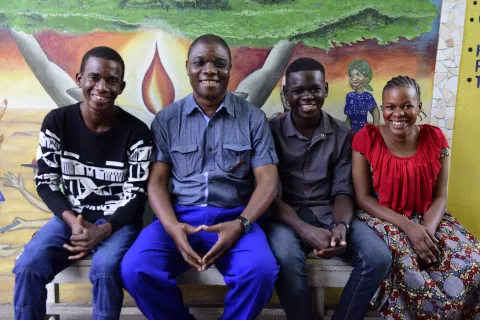Cash Plus
Opening the window of opportunity for adolescents in Tanzania

When 19-year-old Halima had to take on the reins of becoming the breadwinner and caretaker of her family, she was only nine. She was sent off by her parents to live with her bibi (grandmother) and niece in another village in Rungwe district, in south-east Tanzania. Until she was nine Hamila lived with her parents and siblings, and enjoyed learning and playing with her friends in school. But with her bibi’s deteriorating health, Halima was asked to step up and take on the responsibility.
Halima was in middle school when she dropped out. “It became too expensive to continue studying whilst supporting the family,” says the brave 19-year-old, who runs a small-scale-business of purchasing bananas from the local farmers and reselling them at a weekly market. She earns a profit of about Tsh10,000 from each market, and a total income of Tsh40,000 (approximately US$20) on a monthly basis. Halima likes working, but her main challenge remains not being able to meet all needs.
Given a wish, it would be to complete secondary school for Halima. But she has decided to make the most of her life in Rungwe – she sings in the local church, and hopes to have a family of her own one day. “But I don’t want to have children immediately. I want to expand my business and get more capital to start a new one, which will help me and my family live comfortably.”
With the ambition of expanding her business, Halima volunteered to participate in a pre-testing of the new Cash Plus initiative along with 19 other adolescent boys and girls from her village. They were trained on basic health education, business planning and financial responsibility.
Cash Plus is a pilot intervention introduced by the Government of Tanzania and UNICEF in four rural districts in the Southern Highlands, including Rungwe. The intervention provides tailored support during the difficult transition to adulthood to 2,500 adolescents (14-19 years), who are living in households that are enrolled into the government’s social protection programme – the Productive Social Safety Net.
The social protection programme gives income support to the poorest households in Tanzania, which includes Halima’s family. Currently, the basic needs poverty line in Tanzania stands at Tsh36,482 per adult per month.

Halima earns just enough to cover the basic needs of one person, but not three. The support through the Productive Social Safety Net comes on a monthly basis as a cash transfer of Tsh10,000 plus up to an additional Tsh28,000 for households with children that are regularly attending school and getting health check-ups. Yet, in Halima’s case – as is the case of many adolescents in Tanzania – the cash benefit was not enough to overcome the many other challenges that kept her away from school.
“The Cash Plus initiative aims at empowering vulnerable adolescent boys and girls to tackle and overcome difficult challenges, expand their opportunities, and improve their quality of life,” says Ulrike Gilbert-Nandra, Chief of HIV/AIDS at UNICEF Tanzania. The intervention aims to ensure that adolescents grow into healthy and productive adults through intensive life skills training, mentoring and coaching on livelihood enhancement, and sexual and reproductive health.
“These 2,500 adolescents will be supported to go back to school, start vocational training or grow a business whilst building their resilience to manage health-related circumstances that may block them from reaching their goals, such as teenage pregnancy, HIV, and gender based violence.”
Halima is already applying the new tools learnt during the one week pre-testing of the Cash Plus initiative, such as opportunity seeking, record keeping and savings on a day-to-day basis. But she is looking forward to participating in the upcoming Cash Plus intervention: “I want to learn how to do business and be a successful business woman so that I can help my community tackle issues stemming from poverty.”
Following the pre-testing, the group of 20 adolescents have formed a peer support group on their own initiative. This group continues to meet regularly to discuss business ideas and plans, encourage one another to save and reinvest, and to get advice on other struggles in life.
Through supporting each other to plan and set goals, this group of young, committed leaders are planning ways to support many other adolescents like Halima, to use their newly acquired skills to grow their businesses, and to create a better life for themselves and their families.




